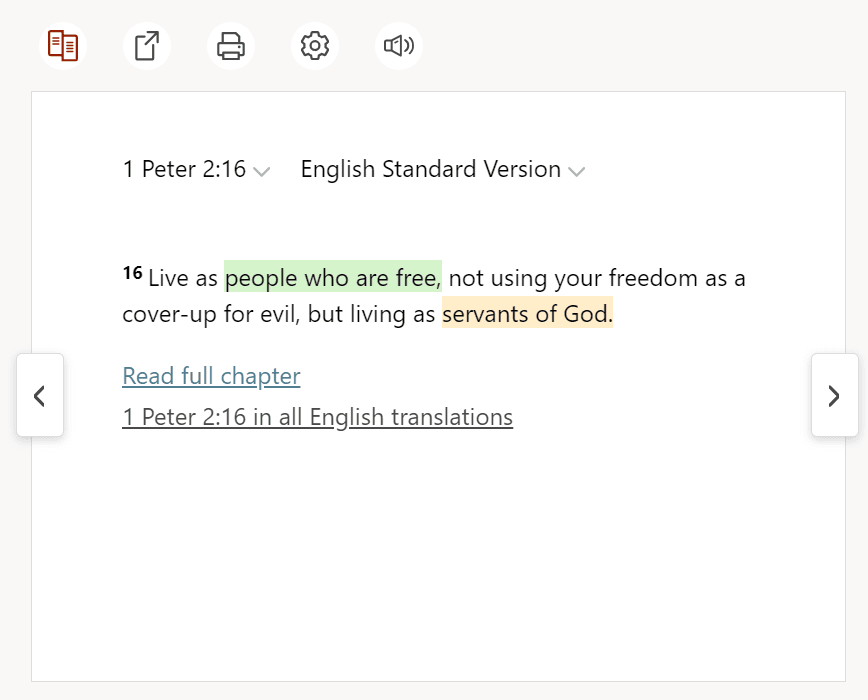
Am I Free?
 img:biblegateway.com
img:biblegateway.comCivil Freedom in America
Among the several recurring conversations in which most Christian pastors find themselves is the topic of “Free Will”.
The stakes are high.
My experience has taught me that many American people do not want to hear what the Bible actually says about human freedom. So proceed at your own risk.
The concept of free will as it pertains to the civil realm is something we have inherited from Plato and Aristotle.
Arend Theodoor Van Leeuwen summarized it well in his “Christianity in World History: The Meeting of the Faiths of East and West”:
“Plato and Aristotle depict the citizen as the completely free man with full command over himself as his own master. Though free, he puts himself under the law, as the only means of securing the “polis” (community) against the despotism of the tyrant on the one hand and mob rule on the other.”
One can see this thought process at work in our US Constitution which states that our “Creator” has “endowed” each of us with the “unalienable right to… liberty” (among other things).
Our founders were making a political statement. But upon closer examination it is (also) a theological assertion.
As a political statement, it effectively charges the government with the duty to defend and preserve these unalienable rights.
Freedom, therefore, is a really big deal for Constitutional America. I’m not here to argue against it.
But as a theological assertion, the Constitution is suggesting that God has given human beings freedom as a kind of birth rite. This… may not be exactly true.
As Americans, we voluntarily submit ourselves to the rule of law. Our Government receives its charter to rule by our consent.
We vote, which is a profound expression of a will that enjoys its freedom.
My purpose in writing today has less to do with the expression of free will in the realm of civics and more to do with how the high stakes of freedom have corroded the Biblical expression of Christian faith.
Christian Freedom in Christ
God has not, in fact, given us “free will”. Not in the way that we understand it being expressed in the realm of civics.
Dr. Robert Kolb, a seminary professor of mine, said the following sentence which I dutifully recorded in my notes: “The belief that God created us and that we are His creatures automatically denies the possibility of our being free.”
To be created is to have a beginning - to be the product of another’s hand. This completely destroys any possibility of living without conditions.
It’s easy to see that any concept of “free will” is necessarily limited (something “less than free”) by the will of the Creator. As I will show you, these limits are profound.
(Those who do not acknowledge a Creator must still acknowledge that “free will” is at least bound by human design. A man is not “free” to breathe water.)
So we have already arrived at a definition of freedom that is something other than the absence of conditions. We are not, in fact, “free”.
The quote from Peter at the top of this essay perfectly illustrates the philosophical conundrum.
Live Free-ish
Peter first says that we are to “live as people who are free”. He then says that the proper expression of that “freedom” is to be “servants of God”.
The word for “servant” could just as easily be translated “slaves”. “Bondservant” is probably the most useful translation.
A slave/servant/bondservant is quite astonishingly NOT free.
In other words, if we are to assert anything about the human will, it must be tempered by certain limitations. Our civic-mindedness begs us to push against this concept, but God is more interested in treating us as his creatures than as Americans.
The real problem begins when people start referring to “free will” as something that God has endowed us with as human creatures.
The thought goes something like this: “Since God has given us free will, we can choose to follow Him or we can choose to rebel against Him”.
On the surface it sounds about right.
It almost perfectly matches our concept of liberty as delineated in the US Constitution.
Since we voluntarily subject ourselves to the laws of our government, it should follow that we also voluntarily subject ourselves to the Law of God.
But scripture speaks a very different word.
For Peter and the rest of the Biblical authors (who we hold were inspired by the Holy Spirit and are therefore speaking the Truth with a capital ‘T’), the human will is always in bondage of one kind or another.
Always.
The “freedom” Peter speaks of is not freedom as we know it in America. Peter’s “freedom” is the equivalent of servitude.
Peter is not alone.
Biblical Freedom
Wherever Christian liberty is discussed in the Bible, it is always within the context of the Lordship of God - Father and/or Son and/or Holy Spirit.
Galatians 5:1 - "It is for freedom that Christ has set us free. Stand firm, then, and do not let yourselves be burdened again by a yoke of slavery."
2 Corinthians 3:17 - "Now the Lord is the Spirit, and where the Spirit of the Lord is, there is freedom."
Psalm 119:45 - "I will walk about in freedom, for I have sought out your precepts."
Notice in each of these examples - and there are many more - “freedom” is something that only exists within the bounding box of the divine will of God.
So there is such a thing as Christian freedom, but it can only ever be expressed when a Christian’s thoughts, words, and deeds perfectly align with the prior will of God.
We’ll come back to this.
Sinful Freedom
First, let’s talk about what “freedom” looks like outside of God’s divine will.
In every single case, whenever any human person is said to be expressing him or herself contrary to the will of God, that person is said to be in “bondage to sin”.
In John 8:34 - "Jesus replied, 'Very truly I tell you, everyone who sins is a slave to sin.'"
Even more to the point, Peter says in 2 Peter 2:19 - "They promise them freedom, while they themselves are slaves of depravity—for 'people are slaves to whatever has mastered them.'"
People are slaves to whatever has mastered them.
One can quickly see that the Bible teaches us that to be outside of the will of God is to be enslaved by something other than God.

Freely Bound
Returning to a life inside of God’s will, that quote from 2 Peter suggests what the rest of scripture makes even more clear. If you are not a slave to sin, then you are a slave to God in Jesus Christ.
Your will is not “free”, it is in bondage either to sin or to Jesus Christ.
The Bible doesn’t make any room for a third way.
So what do Christians mean when they say that God has given us free will?
They usually mean that our faith in Jesus as savior is something we have elected to believe - a choice we have made because God has endowed us with the liberty to reject or accept Him.
But does that assertion align with scripture?
No.
Scripture says that if we do believe in Jesus as savior, it is because God Himself has captured us.
Are you not sure about that? Read Ephesians 2:8-9; Philippians 1:29; John 6:44; John 1:12-13; Acts 13:48; or 2 Peter 1:1, and so on.
These verses collectively highlight the biblical teaching that faith in Jesus Christ is a gift from God, bestowed upon those whom He chooses to bless with it.
Sorry, but you don’t believe as a result of your will. You believe as a result of God’s will.
And once you believe, you are not “free” to do this or that. Your “choice” to sin or not sin is not an expression of freedom.
You sin because your will is in bondage to sin.
You act righteously because your will is in bondage to Christ.
Free will, as it is often taught by well-meaning Christians, is heterodox at best, heretical at worst.
OK. Then why does the Bible use the words “free” and “freedom” at all? What does Peter mean when he says, “live as people who are free”?
Once we’ve agreed that the human will cannot exist in absolute freedom, we can begin to approach the question differently.
“What kinds of freedoms do we have once we are bound to Christ?”
That sounds like a solid, Biblical question.
Human freedom is first of all freedom for service to God.
This means that a Christian has been liberated from temporal concerns in such a way that, according to the will of God, he may begin meeting the needs of God’s creation.
This “freedom for…” places us in harmony with God, fellow man, and nature.
Human freedom is second of all freedom from all evil.
This means that a Christian has been saved from the power of sin, death, and the devil.
It means that Biblical freedom opens us up to eternal life by rescuing us from every other kind of bondage.
This “freedom from…” cannot be “opted into”, it is given (freely!) by God.
As Luther wrote, “I cannot by my own reason or strength believe in Jesus Christ, my Lord, or come to Him…”
As is so often the case, Luther was right.
Finally, there is a third kind of freedom which is not actually freedom at all.
It is, however, what usually passes for freedom by those who want to assert that human beings have “free will”.
Let’s play along with them and call it a “freedom against God”.
This asserts the human capacity to oppose God, an act which destroys true humanity (remember, God created us therefore He defines us).
“Freedom against…” like this is actually the opposite of freedom. It is bondage to whatever the rebellious human has put into that central position that only God ought to occupy.
Freedom against is nothing less than bondage to the lordship of something other than Jesus.
This is the so-called “free will” that so many insist we have.
Yes, we have it. We have too much of it, if we’re honest.
But it isn’t free will, it’s slavery to everything else but God.
Thanks be to God that He has saved us from that and made us his servants.
Closing Prayer
Oh Father and Master in Heaven, I thank you that you have made me your servant. Help me to enjoy my servitude so that I don’t rebel against you and serve another master. More than that, I pray that you would call my neighbors and friends into the same relationship through Jesus Christ. Amen.



